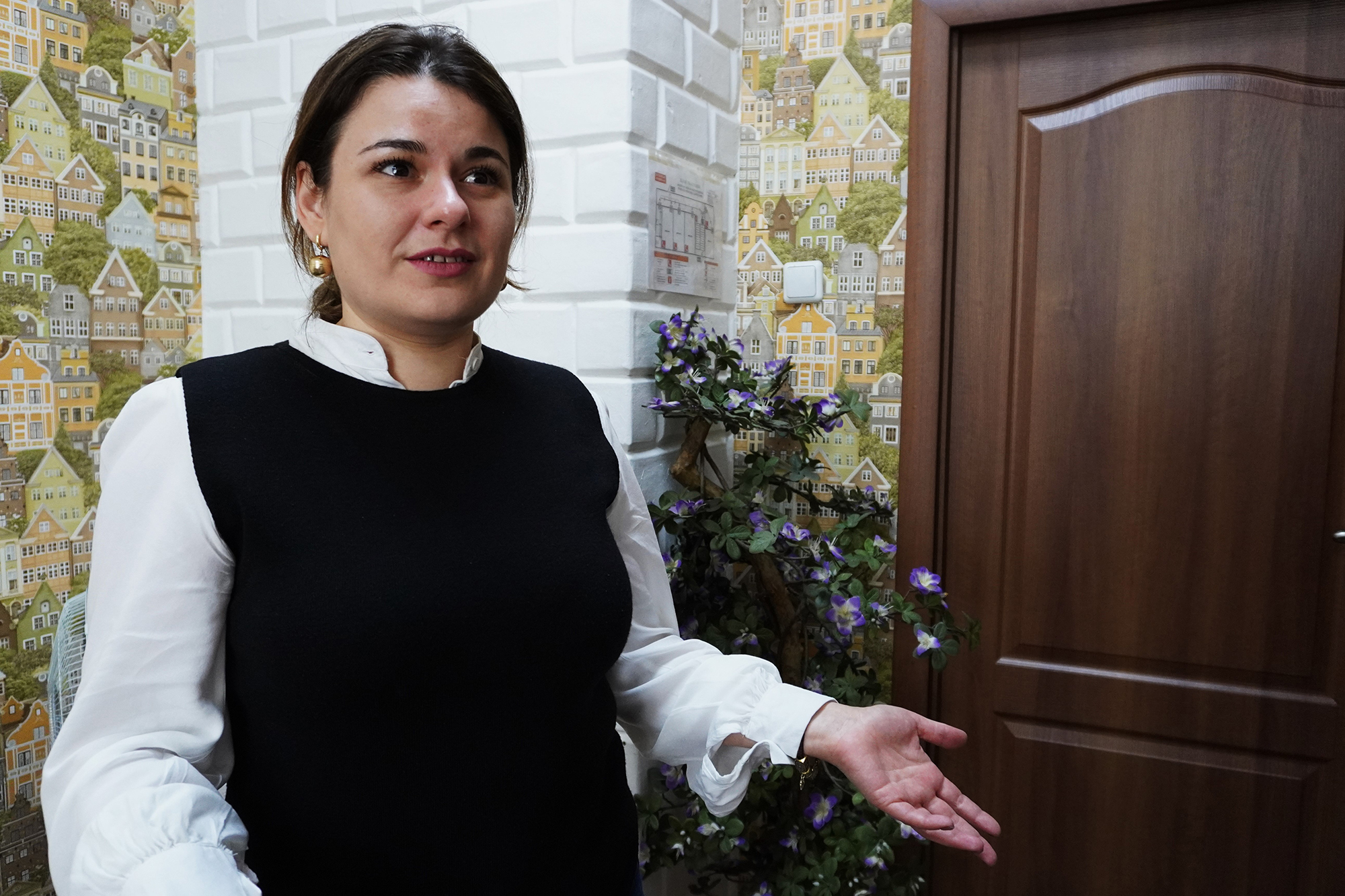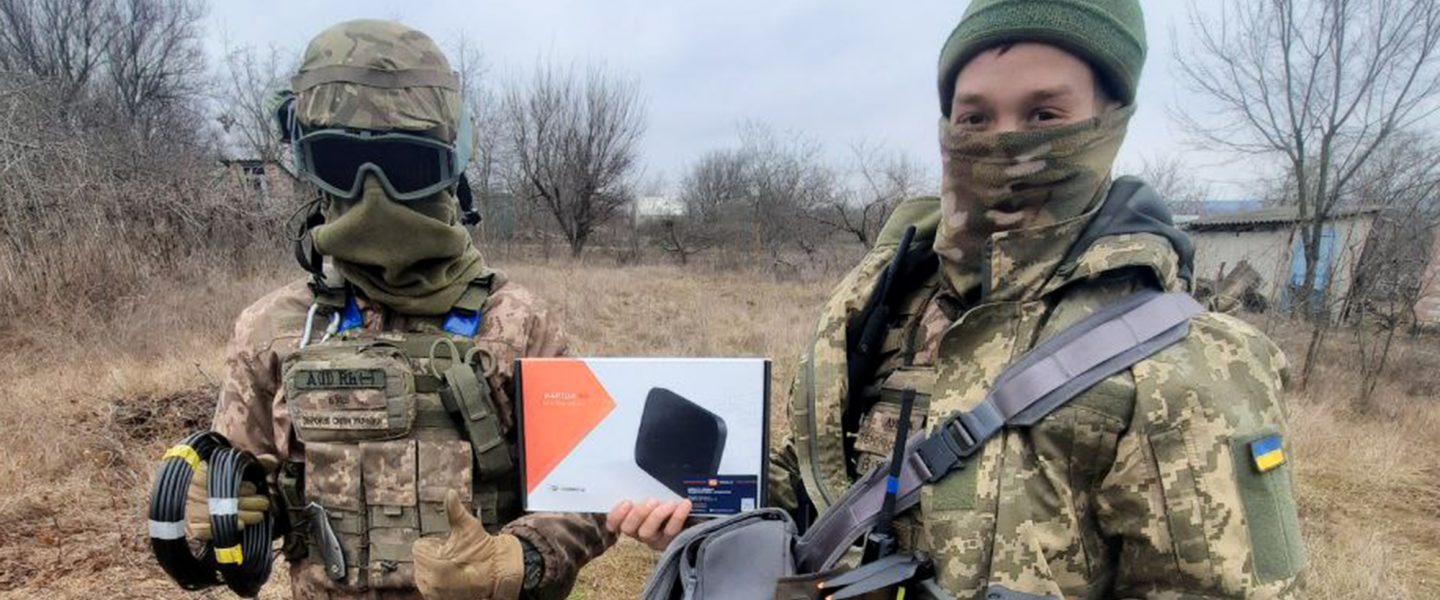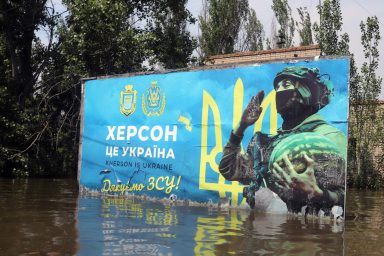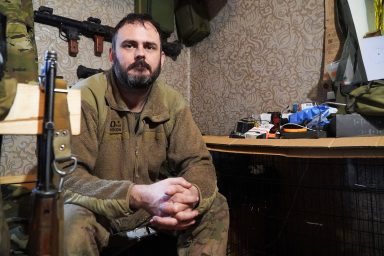A psychiatric hospital in the city of Odesa in Ukraine is overcrowded with Ukrainian soldiers suffering PTSD from the war.
|
Listen To This Story
|
ODESA, Ukraine – Once in a while, 26-year-old Andriy still feels like he’s shaking uncontrollably. Something inside him broke and shattered to pieces when a Russian 152 mm artillery shell landed ten yards away from him in the Kherson region of Ukraine at the beginning of March.
The Russians had spotted his drone unit’s position, Andriy said. As they fired at it, he narrowly managed to jump into a basement. The rest of his drone team also survived, but there were wounded Ukrainian soldiers at another position close by.
“I could hear the grenade a few seconds before it hit,” says Andriy, who was a drone operator in the Ukrainian army. “It was what saved me.”
The grenade left a 3-feet deep hole in the ground, Andriy recalled. It also left a lasting hole in his sense of security. Nothing was the same again.
“I just remember the fear. A huge fear,” Andriy said, “And when I try to remember now, my hands start to shake again.”
Two days later, Andriy was brought to a psychiatric facility in Odesa, where he was later diagnosed with post-traumatic stress disorder.
“I will never forget the sound of the grenade whistle,” Andriy said. While he had experienced artillery attacks before, he said, they had never been this close.
“I just sat down in the basement afterward thinking, this is it. Trying to say goodbye to my life. I was sure that I would die.”
One of Many
Andriy is a patient at the KNP “Odesa Regional Medical Center of Mental Health,” a psychiatric hospital in southern Ukraine. This facility has 1,040 beds but is overcrowded with 1,198 patients right now, according to Anna Velychko, who is the head of the psychiatric department.
It is a mix of civilians and soldiers, many suffering from the memories of war. Many patients are soldiers who are suicidal, Velychko said.
“Others hear voices,” she added. “Some are aggressive and cannot control their emotions.”

The hospital is overcrowded and the staff has to be creative to find space for beds. Photo credit: Stefan Weichert / WhoWhatWhy
Velychko isn’t allowed to divulge exactly how many soldiers are patients at the hospital but says there are a significant number.
“For some, losing friends on the battlefield has been so traumatic that they cannot really move on,” said Velychko. “And some imagine pain which isn’t there. Others just can’t cope with the lack of security they now feel after being close to dying.”
Velychko said that in some sections of the hospital, patients must be locked up and separated because of their behavior, but WhoWhatWhy visited a part of the hospital where the patients are relatively stable. Here, the patients can go outside and mingle with other people, and they can engage in various activities. When WhoWhatWhy visited at the end of April, some of them were planting flowers and tending the garden.
Velychko said she fears Ukraine is facing a significant mental health crisis after the war.
“I see all these people. So many feel guilty, thinking they could have done something different to save their friends. Some are trembling or sweating all the time. You know, all kinds of symptoms. Nightmares, bad dreams,” said Velychko.
“As a society, we need to be able to fight this and help these soldiers and civilians for many years to come,” she said.
“Long after our victory,” she added, confident that Ukraine will win this war.
Wanted to Help
When the Russian invasion of Ukraine began, Andriy was a DJ who had been planning to open a disco with his cousin in Odesa, his hometown. As the Russians crept closer to the city, Andriy said, some of his friends fled.
But Andriy could not do that.
“I felt in my heart that I had to do something to defend my motherland,” Andriy said. “I had to do something.”
With no military experience, Andriy was not eligible to enlist in the Ukrainian army. Instead, he joined one of the territorial defense units which were forming nationwide. These units consisted of volunteers who were often put to work helping patrol checkpoints at the beginning of the Russian invasion.
After several months in a territorial defense unit, Andriy joined a Ukrainian army brigade and became a drone operator. His job was to spot Russian positions and give coordinates to artillery units.
Andriy’s girlfriend broke up with him soon after he joined the territorial defense unit. She didn’t want to wait for him.
“But I just couldn’t sit and do nothing,” Andriy said.

Anna Velychko explains that it is difficult to keep up with her many patients. Photo credit: Stefan Weichert / WhoWhatWhy
Doesn’t Talk
Velychko told WhoWhatWhy that she isn’t very optimistic about the future.
“Right now, there is a lot of media attention on the war. People are supporting, donating,” said Velychko.
But her patients will need help for a long time, she said. And once the war is over, it will be easy for the world to forget about them.
One patient at the psychiatric hospital can’t speak at all. Since he had a nervous breakdown, he sits quietly all day, Velychko said. Only at night, while he is dreaming, he starts to talk. While what he is saying is often impossible to understand, sometimes she can tell that he is reliving nightmares from his battles at the front line.
Velychko said she fears that soldiers will take their mental health problems home to their children. That fear is substantiated by research. Last year, Shekhar Saxena told WhoWhatWhy that this war will impact people’s mental health in Ukraine for a long time. Saxena is a professor of the practice of global mental health at Harvard’s Department of Global Health and Population.
“The people who have gone through this kind of trauma can actually pass it on to future generations because their own behavior and their way of coping with betrayal and trauma will change, and the way they bring up their children will also change,” Saxena told WhoWhatWhy.
‘I Will Carry That Around With Me Forever’
Andriy said that he might be able to leave the hospital soon. It is possible that he could even return to the army, according to a psychiatrist there, though he will never be able to serve on the front line again.
“When all this is over, I want to help build a better country. A better Ukraine,” Andriy said. He would like to travel around the world, he added. But he will never forget what he has seen in this war.
“I will carry that around with me forever,” he said.






